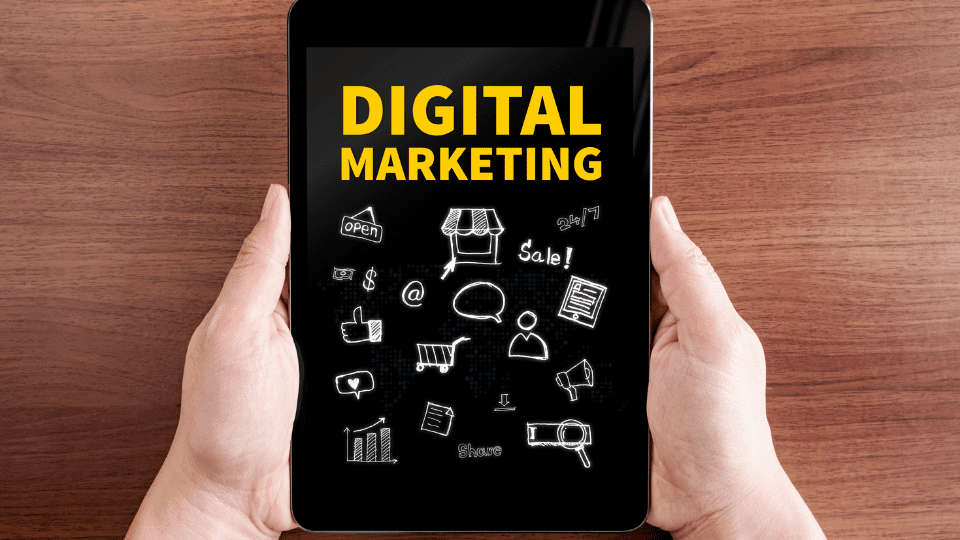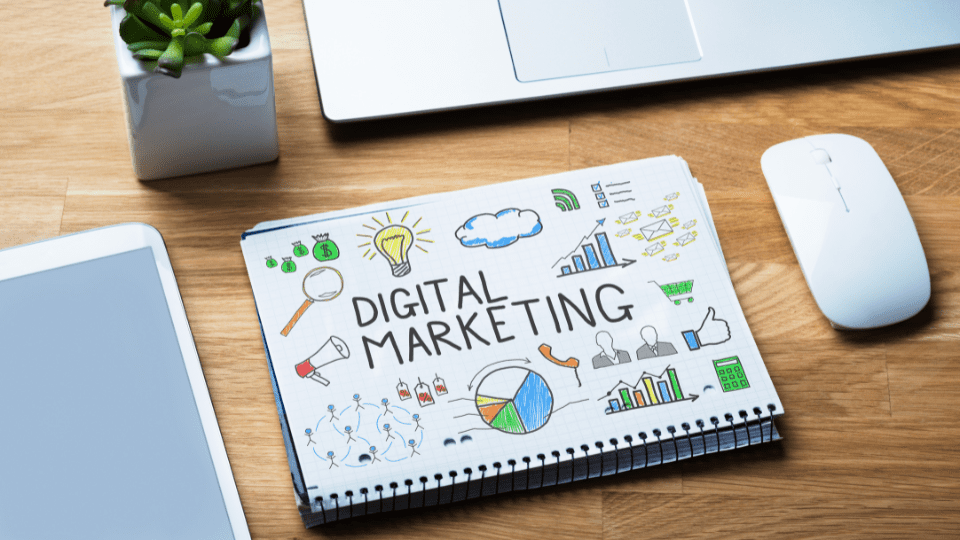In today’s rapidly evolving business landscape, the importance of digital marketing cannot be overstated. As traditional marketing methods lose their edge in an increasingly digital world, businesses must pivot to digital marketing strategies to ensure survival and growth. The global digital advertising and marketing market, projected to reach $786.2 billion by 2026, underscores the necessity for businesses of all sizes to invest in robust digital marketing efforts. This article will explore the indispensable role digital marketing plays in business success, examining key strategies and tools that can elevate a brand’s presence, engagement, and profitability.
Understanding Digital Marketing For Online Business

What is Digital Marketing?
Digital marketing encompasses a range of online channels and techniques designed to promote products or services. Unlike traditional marketing, which relies on physical media and in-person interactions, digital marketing leverages the Internet and electronic devices to reach a broader audience. This approach increases a business’s visibility and allows for targeted engagement with specific demographics.
Key digital marketing channels include:
- Search Engine Optimization (SEO)
- Content Marketing
- Social Media Marketing
- Pay-Per-Click (PPC) Advertising
- Email Marketing
- Influencer Marketing
Each channel plays a unique role in a comprehensive digital marketing strategy, contributing to a business’s ability to connect with potential customers and build a strong brand.

The Strategic Importance of Digital Marketing For Online Business
Enhancing Brand Awareness and Growth
One of the most significant advantages of digital marketing is its ability to enhance brand awareness. By utilizing digital platforms, businesses can reach a global audience, far exceeding the limitations of traditional marketing methods. This level of exposure is crucial for small and medium-sized enterprises (SMEs) looking to compete with larger, more established brands.
Through consistent and strategic digital marketing efforts, businesses can:
- Increase Brand Visibility: SEO and content marketing help improve search engine rankings, making it easier for potential customers to find your brand.
- Build Brand Identity: Social media platforms allow businesses to craft a unique voice and personality, fostering a deeper connection with their audience.
- Expand Market Reach: Digital marketing breaks geographical barriers, enabling businesses to enter new markets and attract a diverse customer base.
Targeting the Right Audience
Digital marketing’s precision targeting capabilities set it apart from traditional marketing. Businesses can use data-driven insights to identify and reach their ideal customers based on demographics, interests, and online behavior. This targeted approach not only maximizes marketing efficiency but also improves conversion rates by delivering relevant content to the right audience.
Key strategies include:
- SEO and Keyword Targeting: By optimizing website content with relevant keywords, businesses can attract users actively searching for their products or services.
- PPC Advertising: Paid ads on platforms like Google and Facebook allow businesses to target specific demographics, ensuring their ads are seen by potential customers who are most likely to convert.
- Social Media Targeting: Platforms like Instagram, LinkedIn, and Twitter offer advanced targeting options based on user interests, behaviors, and demographics, enabling businesses to tailor their messaging to specific audience segments.
Cost-Effectiveness and Measurability
Digital Marketing For Online Business is not only more affordable than traditional marketing methods, but it also offers unparalleled measurability. Businesses can track every aspect of their digital campaigns in real time, from impressions and click-through rates to conversions and return on investment (ROI). This level of transparency allows for data-driven decision-making, enabling businesses to optimize their strategies for maximum effectiveness.
- Lower Costs: Digital marketing often requires a smaller budget than traditional methods, making it accessible for businesses of all sizes.
- Real-Time Analytics: Tools like Google Analytics and social media insights provide real-time data, allowing businesses to monitor performance and make adjustments on the fly.
- Higher ROI: Digital marketing channels like email and SEO typically yield higher ROI compared to traditional methods, as they target specific audiences with personalized messaging.
Essential Digital Marketing Strategies

Search Engine Optimization (SEO)
SEO is the backbone of any successful digital marketing strategy. By optimizing your website and content for search engines, you can improve your ranking on search engine results pages (SERPs), making it easier for potential customers to find your business. Effective SEO involves a combination of on-page and off-page techniques, including keyword research, content optimization, internal linking, and backlink building.
Key SEO Strategies:
- Keyword Optimization: Conduct thorough keyword research to identify high-value terms that align with your business offerings and customer search intent.
- Content Quality: Create authoritative, informative, and engaging content that answers your audience’s questions and meets their needs.
- Technical SEO: Ensure your website is technically sound, with fast load times, mobile optimization, and a secure HTTPS connection.
Content Marketing
Content marketing is about providing value to your audience through high-quality content that informs, entertains, or educates. This strategy helps establish your brand as an authority in your industry, driving organic traffic and fostering customer loyalty.
Effective Content Marketing Tactics:
- Blogging: Regularly publish well-researched, keyword-rich blog posts that address the pain points and interests of your target audience.
- Video Content: Leverage the power of video to engage your audience, whether through tutorials, product demos, or brand storytelling.
- Whitepapers and E-books: Offer in-depth resources that provide value and demonstrate your expertise, capturing leads through gated content.
Social Media Marketing
Social media platforms are powerful tools for building brand awareness, engaging with your audience, and driving traffic to your website. A well-executed social media strategy can enhance your brand’s reputation and foster a loyal community of followers.
Social Media Best Practices:
- Platform Selection: Focus on the platforms most relevant to your target audience, whether it’s Instagram for visual content or LinkedIn for B2B marketing.
- Content Consistency: Maintain a consistent posting schedule to keep your audience engaged and informed.
- Engagement: Actively respond to comments, messages, and mentions to build relationships and foster a sense of community.
Pay-Per-Click (PPC) Advertising
PPC advertising allows businesses to quickly drive traffic to their website by paying for ad placements on search engines and social media platforms. This strategy is highly effective for generating leads and sales, particularly when paired with a well-optimized landing page.
PPC Advertising Tips:
- Ad Copy: Write compelling ad copy that includes a clear call to action and aligns with user intent.
- Landing Pages: Ensure your landing pages are optimized for conversions, with relevant content, clear messaging, and an intuitive user experience.
- Budget Management: Continuously monitor your ad spend and adjust bids to maximize ROI.
Email Marketing
Despite being one of the oldest forms of Digital Marketing For Online Business, email marketing remains a powerful tool for nurturing leads and driving conversions. Personalized email campaigns can help build relationships with your audience and keep your brand top-of-mind.
Email Marketing Strategies:
- Segmentation: Segment your email list based on demographics, purchase history, and engagement levels to deliver personalized content.
- Automation: Use automation tools to send targeted emails based on user behavior, such as abandoned cart reminders or post-purchase follow-ups.
- Performance Tracking: Monitor open rates, click-through rates, and conversion rates to continuously refine your email campaigns.
Influencer Marketing
Influencer marketing involves partnering with individuals who have a strong online presence and influence over your target audience. This strategy can help amplify your brand’s message and reach new customers through authentic, relatable content.
Influencer Marketing Tips:
- Audience Alignment: Choose influencers whose audience aligns with your target market to ensure your message resonates.
- Authenticity: Collaborate with influencers who genuinely believe in your brand and can authentically promote your products or services.
- Measurement: Track the performance of influencer campaigns through metrics like engagement, reach, and conversions.
Maximizing The Impact on Digital Marketing For Online Business
Leveraging Data and Analytics
To maximize the impact of your digital marketing efforts, it’s essential to leverage data and analytics. By continuously analyzing campaign performance, you can identify areas for improvement and make data-driven decisions that enhance your overall strategy.
Key Metrics to Monitor:
- Traffic Sources: Understand where your website traffic is coming from to allocate resources effectively.
- Conversion Rates: Track how well your marketing efforts are converting leads into customers.
- Customer Lifetime Value (CLV): Measure the long-term value of your customers to inform marketing spend and strategy.
Conclusion
Digital Marketing For Online Business is an indispensable component of modern business strategy. By harnessing the power of digital channels, businesses can enhance their brand visibility, engage with a broader audience, and drive sustained growth. The ability to measure and optimize these efforts in real time ensures that businesses can continually refine their approach, maximizing ROI and staying ahead of the competition. As the digital landscape continues to evolve, the importance of a well-executed digital marketing strategy will only grow, making it a critical investment for businesses looking to thrive in today’s market.
Source: Digital Marketing For Online Business
See also: Microfinance Management, microfin360






